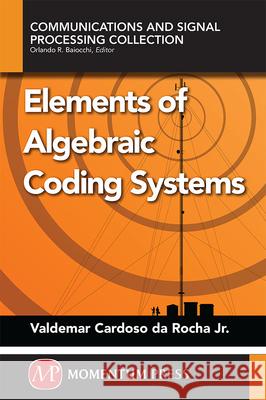Elements of Algebraic Coding Systems » książka
Elements of Algebraic Coding Systems
ISBN-13: 9781606505748 / Angielski / Miękka / 2014 / 206 str.
Elements of Algebraic Coding Systems is an introductory text to algebraic coding theory. In the first chapter, you'll gain inside knowledge of coding fundamentals, which is essential for a deeper understanding of state-of-the-art coding systems. This book is a quick reference for those who are unfamiliar with this topic, as well as for use with specific applications such as cryptography and communication. Linear error-correcting block codes through elementary principles span eleven chapters of the text. Cyclic codes, some finite field algebra, Goppa codes, algebraic decoding algorithms, and applications in public-key cryptography and secret-key cryptography are discussed, including problems and solutions at the end of each chapter. Three appendices cover the Gilbert bound and some related derivations, a derivation of the Mac- Williams' identities based on the probability of undetected error, and two important tools for algebraic decoding--namely, the finite field Fourier transform and the Euclidean algorithm for polynomials.
Elements of Algebraic Coding Systems is an introductory textto algebraic coding theory. In the first chapter, youll gain insideknowledge of coding fundamentals, which is essential for a deeperunderstanding of state-of-the-art coding systems.This book is a quick reference for those who are unfamiliar withthis topic, as well as for use with specific applications such as cryptographyand communication. Linear error-correcting block codesthrough elementary principles span eleven chapters of the text.Cyclic codes, some finite field algebra, Goppa codes, algebraic decodingalgorithms, and applications in public-key cryptography andsecret-key cryptography are discussed, including problems and solutionsat the end of each chapter. Three appendices cover the Gilbertbound and some related derivations, a derivation of the Mac-Williams identities based on the probability of undetected error,and two important tools for algebraic decoding-namely, the finitefield Fourier transform and the Euclidean algorithm for polynomials.











